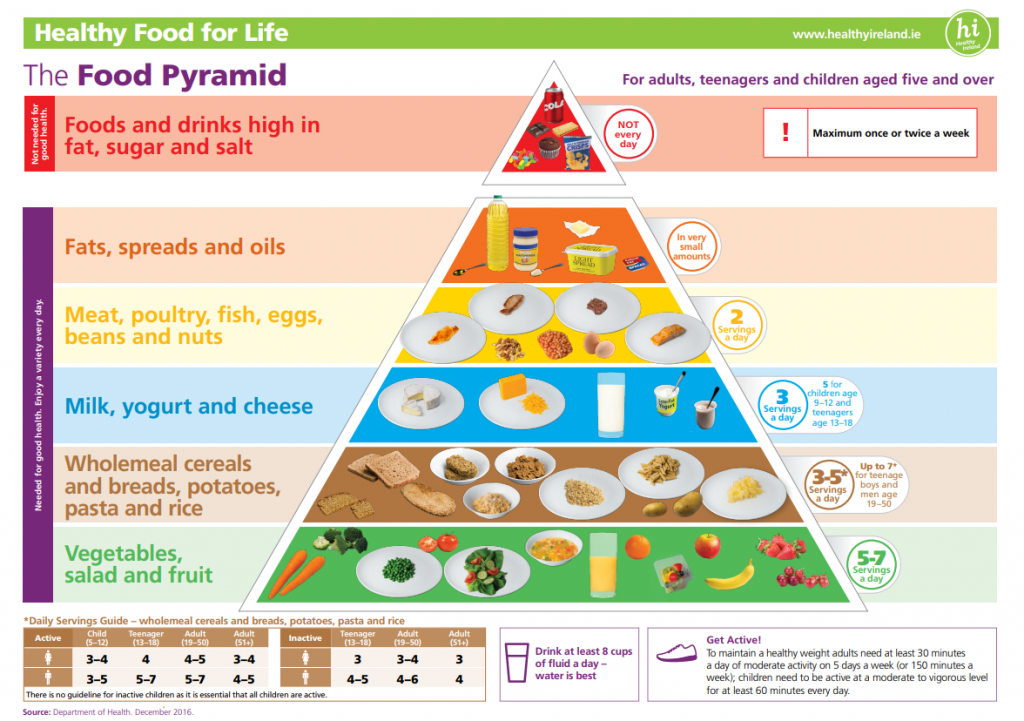[This is a guest post by Consultant Dietitian Gillian McConnell]
Rethinking your dietary habits is just what can give you a wealth of physical and mental benefits that could give you a new lease of life. Think of your body as a machine: fuel/ power is important for a machine to run efficiently. Good/ clean fuel; a car runs well. Bad/dirty fuel over an extended period, the engine will breakdown.
Your health is your responsibility and no one else’s – take care of it and control it.
Ask your doctor to give you a thorough check-up and follow up with regular check-ups. Put into practice the advice you are given – do it now and remember growing old is a gift! Nurture it!
Focus on wholefoods:
Your body is built from the food you take in, so what you eat has a huge impact both on how you feel and on how your body functions to protect you from disease.
Be conscious of your weight; excess weight may increase the risk of heart attack and stroke and other chronic diseases. It can also seriously reduce your mobility just when you need it most to enjoy your retirement. Fad diets don’t work!! Weight reduction is about lifestyle changes and being conscious of the type and portion size of the food you eat. Eat a wide variety of foods, wholefoods where possible and load up on fruit and vegetables throughout the day. Good rule of thumb: At main meals, try to eat ½ a plate of vegetables or salad, ¼ of your plate complex carbohydrates such as wholegrain rice, pasta, spaghetti or two egg sized potatoes with skins and ¼ of your plate lean protein such as chicken without skin, lean meat and fish or pulses / lentils / tofu.
Carbohydrates/starchy foods, aim for 4 – 5 portions per day:
Include wholegrain pasta, brown rice, wholemeal bread, high fibre breakfast cereals and potatoes with skins for more fibre. These foods also give you energy and it is best to have some at every meal. High fibre varieties will help keep you fuller for longer and for slow release energy.
Fruit and Vegetables, aim for 7 – 10 portions per day:
Fibre is a crucial element as our body’s age. Increasing your fibre intake will lead to better digestion and prevention of constipation. Fruit and vegetables are rich in vitamins, minerals and antioxidants. These help keep your immune system working well, prevent coronary heart disease, cancer and boost energy levels. 1 serving is :100ml glass of fresh fruit juice; 1 medium sized fruit like an apple / pear / banana; 2 smaller fruits like 2 plums / 2 kiwis / 2 satsumas; a cup of berries; 3 dessert spoons of salad/vegetables; 1 bowl of homemade vegetable soup.
Dairy Foods, aim for 3 portions per day:
As we get older, bone density reduces which makes taking care of your bones hugely important. Your best sources of calcium are dairy, nuts, seeds, leafy greens and pulses. One serving is: 1 glass of milk, 1 yoghurt or 1oz of hard cheese, e.g., cheddar. If you need to avoid dairy foods it is best to have your diet checked by a Registered Dietitian to make sure you are getting enough calcium or take a calcium supplement with at least 800mg of calcium every day.
Meat, Fish and Alternatives, aim for 2 – 3 portions per day:
This group of foods, includes chicken, beans, lentils and nuts and are all rich in protein. Many of these foods are also high in iron. Protein is needed for healthy muscles and bones and for any repair your body might need to undergo (for example if you have any surgery). As we age we are not as efficient at metabolising protein, therefore we need to make sure we get enough at each meal every day. Iron is needed to help your blood carry oxygen around your body and red meat, chicken, fish, eggs and beans are all good sources. We need protein foods with at two to three meals every day. A good guide is: a serving is about size of your palm of your hand for your main meal and about 1/2 the palm of our hand for your light meal. Try to eat oily fish once per week which has an anti-inflammatory effect for the body. Examples are salmon, herring, mackerel, sardines and trout.
Fats and oils
These are needed by the body to help support your vital organs — but only in small amounts and the type of fat you choose is important. Too much saturated fat can increase cholesterol and is linked with an increased risk of heart disease and many cancers. Healthier fats are monounsaturated fats — these fats are found in olive oil as well as rapeseed and peanut oil. Stick to one handful of nuts a day as they are high in calories. Avocados also contain healthy oils, one avocado per week per person is a healthy amount. You don’t need to cut out saturated fat, but try not to eat foods that are high in saturated fat daily. Saturated fat is found in high fat dairy foods (cheese, cream and butter); biscuits, cakes and pastries; and in processed meats like sausages, black and white pudding and pate. The fat on meat and the skin on chicken are also high in saturated fat.
Salt
We all know that too much salt is bad for you no matter what your age. Salt has been proven to raise blood pressure which can result in increased risk of heart disease or stroke. With this in mind, you should look to reduce your salt intake where possible. Keep an eye on packaged goods and ready-made meals as the salt can add up quickly to become a problem. Making a switch in your shopping will take time, but choosing wholefoods as much as possible will help to reduce salt overall in your diet. Aim for no more than 6g salt per day.
Hydration
This is often overlooked but in actual fact fluids are one of the most important factors in maintaining good health. Not only will drinking adequate fluids help to prevent dehydration, it will also help with brain function, aid digestion and help improve energy levels. Even if you don’t feel thirsty, it’s important to remind yourself to drink regularly. Aim to drink 10 glasses of fluid per day. As well as water, other fluids such milk, soup, juice, tea and coffee count towards fluid intake.
Alcohol
Although alcohol is not technically a food group as it is not vital for living. It is nonetheless popular with many people in Ireland! Excess alcohol can lead to liver problems, increased risk of stroke and adds to weight related issues, to name but a few. Keep alcohol to under 17 standard drinks a week for men, 11 a week for women — and remember this is a limit, not a target: 1 standard drink is ½ a pint of beer/cider/stout/ale; 100mls of wine (seven small glasses from a bottle); and 1 pub measure of spirits. Make sure you have at least 3 alcohol free days a week. Remember a “binge” is 5 drinks; that is: 2 ½ pints of beer or 2/3 of a bottle of wine – Are you a regular “binge” drinker?
Key Nutrients
Omega-3 fat
This type of fat is linked with a reduced risk of heart disease and Alzheimers and improves your chances of surviving certain types of cancer. The best type of omega-3 fats are found in oil-rich fish (salmon, trout, mackerel, herring, sardines and fresh tuna), It is recommended that we eat fish at least twice a week, one of which should be oily fish. Alternatively you can take a fish oil supplement. Look for one that gives you 500 mg per day of EPA and DHA. the type of omega-3 found in fish.
Fibre
Essential for a healthy digestive system, fibre is also linked with a reduced risk of heart disease and some cancers. You need some high fibre foods at every meal. Try whole grain bread, high fibre breakfast cereals, jacket potatoes, brown rice and pasta and lots of fruit and vegetables. Beans and lentils are also great sources of fibre.
Vitamin D
Needed to help you absorb your calcium, Vitamin D also helps to reduce the risk of fractures or broken bones in older people and improves balance and muscle strength. Vitamin D may also help to reduce gum disease, helping you to hold onto your teeth a lot longer! In theory we should get all the vitamin D we need from the sun but in practice, we get too little sun in Ireland from October to March to make enough vitamin D and many people are low in this nutrient. Oil-rich fish and fortified milk / yoghurts are a good source of Vitamin D but it is a good idea to take a supplement with 5 – 10 micrograms of vitamin D every day.
Physical Health
Staying healthy is one of the best ways to enjoy your retirement and luckily there is a lot you can do to ensure you stay healthy, as well as being energetic right into old age. You can start taking care of yourself at any age and still reap huge rewards – and it doesn’t have to be difficult. Attempt some (or all!) of the advice below and help your body to enjoy a healthy retirement.
Get Some Exercise
Exercise helps to prevent many of the diseases we associate with getting older (diabetes, heart disease, cancer, osteoporosis) but it also helps to reduce stress, increase energy levels, reduce depression and lift your mood — what more could your body ask for? Aim for 40 minutes of any exercise 5 times a week — anything will do as long as you are breathing a little faster and getting warm. Don’t worry if you can’t always make the 5 days a week — even one day a week is better than none.
Build some Muscle
From the age of 50 onwards, we lose 5% muscle per year but eating good quality protein at least twice a day and participating in regular resistance exercise at least three times per week will help you to stay strong and keep your balance. Try some exercises that work all of your muscles like Pilates or yoga or join a gym and get a good program to help build muscle for now and the future.
Tobacco Reduction
Complete elimination of a smoking habit is vital for longevity.
Mental Health and Attitude
A major life change such as retirement may bring its own anxieties due to the amount of adjustment you have to make to your timetable and social environment.
– Be prepared for some blues – they will pass.
– Avoid talking to people who will make you more anxious by projecting their own fears into you.
– Surround yourself with positive people with positive “get up and go” attitudes. Build a positive but realistic vision of your future but plan and work actively at making it happen.
– Set yourself a minor goal every morning. Above all, keep a positive outlook on life.
– Learn to relax and adopt a number of mentally stimulating activities to keep you in a good mental state. Try simple contemplations for a short while each day.
– Reading is the most obvious such exercise but also doing crosswords, sudoku as well as many card games can also help. The spiritual dimension also allows the inner-spirit to enjoy your new found freedom.



